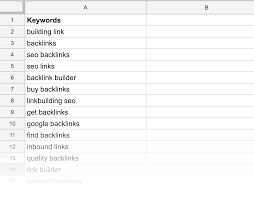Unlocking the Potential of SEO Keywords: A Guide to Optimising Your Online Presence

The Power of SEO Keywords
In the world of digital marketing, Search Engine Optimization (SEO) plays a crucial role in driving traffic to websites. One of the key components of SEO is the use of keywords. Keywords are specific words or phrases that users type into search engines to find information, products, or services online.
Choosing the right keywords for your website is essential for improving your search engine rankings and increasing visibility to your target audience. By incorporating relevant keywords into your website content, meta tags, and other elements, you can help search engines understand what your site is about and match it with user queries.
Effective keyword research involves identifying popular search terms related to your business or industry. Tools like Google Keyword Planner, SEMrush, and Ahrefs can help you discover relevant keywords with high search volume and low competition. By strategically integrating these keywords into your website content, you can attract more organic traffic and improve your chances of ranking higher in search results.
However, it’s important to use keywords naturally and avoid “keyword stuffing,” which can harm your site’s credibility with both users and search engines. Focus on creating high-quality, informative content that addresses the needs and interests of your target audience while incorporating relevant keywords in a seamless manner.
Regularly monitoring and updating your keyword strategy is also crucial for staying competitive in the ever-evolving landscape of SEO. By analysing performance metrics like click-through rates, bounce rates, and keyword rankings, you can refine your keyword selection and optimization techniques to drive better results over time.
In conclusion, SEO keywords are a powerful tool for enhancing your website’s visibility and attracting organic traffic from search engines. By conducting thorough keyword research, strategically implementing relevant keywords, and continuously refining your approach based on performance data, you can maximise the impact of SEO on your online presence.
Effective SEO Keyword Strategies: Five Essential Tips for Success
- 1. Research relevant keywords that align with your content and target audience.
- 2. Use long-tail keywords for more specific and targeted search queries.
- 3. Place keywords strategically in titles, headings, meta descriptions, and throughout the content.
- 4. Avoid keyword stuffing as it can harm your SEO efforts; focus on natural integration instead.
- 5. Monitor keyword performance regularly and make adjustments based on analytics data to improve SEO results.
1. Research relevant keywords that align with your content and target audience.
To enhance your website’s search engine visibility, it is crucial to conduct thorough research on relevant keywords that align closely with your content and target audience. By identifying and incorporating keywords that accurately reflect the topics and interests of your audience, you can increase the chances of your website appearing in search results when users are looking for information related to your niche. Understanding the search behaviour of your target audience and selecting keywords that resonate with their queries will not only improve your SEO strategy but also drive organic traffic to your site.
2. Use long-tail keywords for more specific and targeted search queries.
When it comes to SEO keywords, using long-tail keywords can significantly enhance your search engine optimization strategy. Long-tail keywords are more specific and targeted phrases that cater to niche audiences and address particular search queries. By incorporating long-tail keywords into your website content, you can attract highly relevant traffic and improve your chances of ranking well for specific topics or products. This focused approach not only helps you reach a more qualified audience but also increases the likelihood of converting visitors into customers.
3. Place keywords strategically in titles, headings, meta descriptions, and throughout the content.
To maximise the effectiveness of your SEO strategy, it is crucial to strategically place keywords in key areas such as titles, headings, meta descriptions, and throughout your content. By incorporating relevant keywords in these strategic locations, you can signal to search engines the primary focus of your website or webpage. This not only helps improve your search engine rankings but also enhances the overall user experience by providing clear and concise information that aligns with user search queries. Remember to use keywords naturally and avoid over-optimisation to ensure a balance between SEO best practices and engaging content for your audience.
4. Avoid keyword stuffing as it can harm your SEO efforts; focus on natural integration instead.
To enhance your SEO efforts, it is crucial to avoid keyword stuffing, as this practice can have a detrimental impact on your website’s search engine rankings. Instead, focus on naturally integrating relevant keywords into your content to ensure a seamless user experience and improve your site’s visibility online. By prioritising the natural flow of keywords within your content, you can strike a balance between optimising for search engines and providing valuable information to your audience.
5. Monitor keyword performance regularly and make adjustments based on analytics data to improve SEO results.
To enhance your SEO strategy, it is crucial to monitor keyword performance regularly and make adjustments based on analytics data. By tracking metrics such as click-through rates, bounce rates, and keyword rankings, you can gain valuable insights into the effectiveness of your chosen keywords. This data allows you to identify trends, understand user behaviour, and refine your keyword selection to improve SEO results over time. Continuous monitoring and analysis enable you to adapt to changes in search engine algorithms and user preferences, ensuring that your website remains optimised for maximum visibility and organic traffic.
